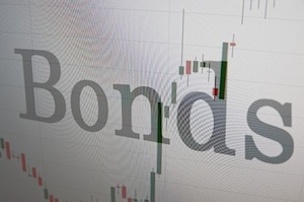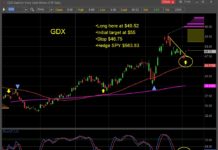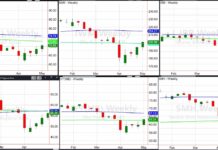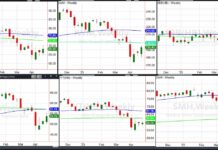The U.S. stock market may finally be entering a ‘normal’ correction. Yet, we are only down roughly 3 percent from the highs set in May. Year-to-date (through Monday), the S&P 500 and the Dow Jones Industrial Average are flirting with negative territory, with the S&P 500 up 0.48% and the Dow Jones down 0.78%. Small caps and tech stocks are faring a bit better with the NASDAQ and Russell 2000 indexes up 5.4% and 3.5%. It feels a lot worse than that solely because it has been so long since investors have experienced even a 5% correction.
But with world markets starting to stutter, U.S. treasury bonds have been catching a bid.
And this leads to a bigger question: Is it time to panic?
No. I do not believe that we are entering a Bear market nor do I believe that we will see markets correct the “typical” 10-20%. It is important that investors adjust their allocation based on their risk tolerance and objectives because I do expect stock market volatility to remain for a while. Accordingly, I have been selectively reducing exposure to stocks.
 On the other hand, the uncertainty surrounding Greece has resulted in a rush to the safety of U.S. Treasury bonds and we’ve seen the positions in the iShares 20+ Year Treasury Bonds ETF (TLT) and Vanguard Extended Duration Bond ETF (EDV) recover 3-5% in the last few days. I have held on to these positions for several months because the economic trends and indicators were signaling that the U.S. economy continues to slow. Employment has now been slowing for 4 months while inflation expectations continue to decline.
On the other hand, the uncertainty surrounding Greece has resulted in a rush to the safety of U.S. Treasury bonds and we’ve seen the positions in the iShares 20+ Year Treasury Bonds ETF (TLT) and Vanguard Extended Duration Bond ETF (EDV) recover 3-5% in the last few days. I have held on to these positions for several months because the economic trends and indicators were signaling that the U.S. economy continues to slow. Employment has now been slowing for 4 months while inflation expectations continue to decline.
In a recent commentary, I outlined how 11 of 17 Wall Street ‘analysts’ were expecting the Federal Reserve to raise interest rates in September. I explained in detail why I disagreed. Well, the probability of a Fed rate hike in September has dropped from 40% down to 16% in the last week. It is highly unlikely that the Federal Reserve will raise interest rates anytime in 2015. Based on the information available, I believe it will be at least into mid-2016 if not later.
Why? There are several reasons but it all boils down to a lack of growth. If the Fed raises rates too soon they could easily plunge a fragile US economy into recession. They have been fighting for years with every tool in their arsenal to try to spur growth and have failed, so the risks associated with a premature rate hike are simply too high. Moreover, a Fed rate hike has implications worldwide and could plunge other countries into recession as well. That’s why the normally reticent IMF has become so vocal in their opposition to a Fed rate hike. The latest headline today from WSJ reads:
IMF: U.S. Economy at Risk of Stalling Next Year if Fed Raises Rates Prematurely
International Monetary Fund reiterates call for Fed to hold off on rate rise until 2016
There are several other developments that indicate the fragile nature of the world economy right now. For instance, any resolution to the Greek crisis is going to result in the Euro declining relative to the US Dollar. That has the impact of importing deflation to the U.S. That will reduce our exports and decrease our GDP. We have been struggling to achieve even a 2% annual GDP and the Greek resolution (when it happens) will make that even harder to do.
Then there is China. Their stock market (which has soared the last several months) is now crashing. It is down roughly 25% in the last month. So what does China do? They suspend trading in over 200 stocks and the market still goes down. Roughly 1.4 Trillion of stocks have been suspended from trading in an effort to prevent further meltdown. China is in trouble and so is Europe. Both will likely affect the U.S.
In this type of environment I am perfectly comfortable having a large allocation to cash and U.S. Treasury bonds. It has been a painful and volatile 6 months in bond ETF’s like TLT and EDV, but U.S. Treasury bonds are still the most dependable safe haven in the world—doing even better than gold. The positions in TLT and EDV should continue to protect portfolios amidst a volatile and uncertain backdrop (and various crises around the world). Market volatility will likely remain elevated for quite a while, and owning U.S. treasury bonds should be an effective way of trying to smooth out the ups and downs in stocks and possibly even grab some gains.
Twitter: @JeffVoudrie
The author holds positions in mentioned securities such as TLT and EDV at the time of publication. Any opinions expressed herein are solely those of the author, and do not in any way represent the views or opinions of any other person or entity.








